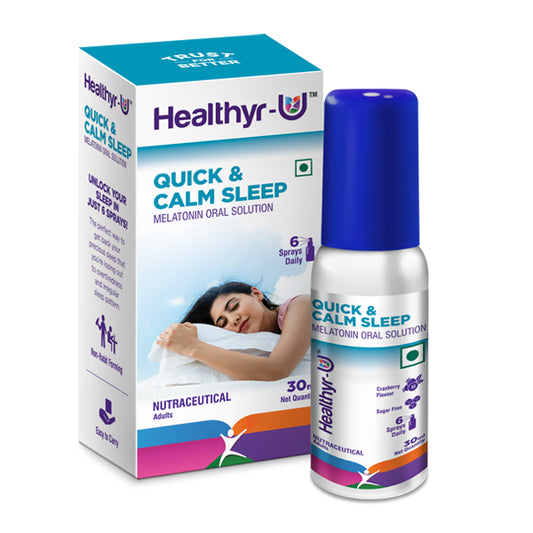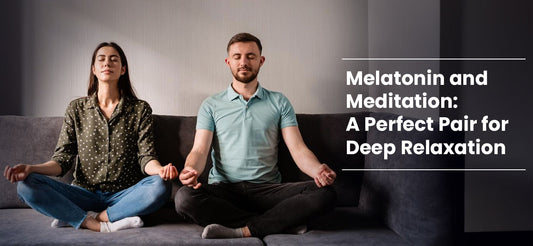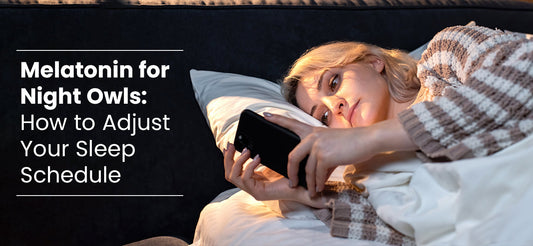Overview
In the fast-paced world we live in, sleep often takes a backseat to our busy schedules and demanding responsibilities. As a result, many individuals struggle with sleep disorders and insomnia, seeking effective solutions to improve their sleep quality. In recent years, melatonin supplements have gained popularity as a natural remedy to aid sleep. Among the various options available, melatonin spray and melatonin tablets are two prominent choices. But the question remains: which form of melatonin use is better? In this article, we'll delve into the science behind melatonin, compare the efficacy and safety of melatonin spray and tablets, and help you make an informed decision about the best option for melatonin for insomnia. [1,2]
Understanding Melatonin: The Sleep Regulator
Before we delve into the debate between melatonin spray and melatonin tablets, it's important to understand what melatonin is and how it affects sleep. Melatonin is a hormone produced naturally by the pineal gland in response to darkness, helping regulate our circadian rhythm, also known as our internal body clock. It signals to our body that it's time to wind down and prepare for sleep. However, factors like excessive screen time, irregular sleep schedules, and stress can disrupt our natural melatonin production, leading to difficulties falling asleep. [1,3]
Melatonin Supplements: A Brief Overview
Melatonin supplements, available in various forms, are designed to mimic the natural hormone's effects and help regulate sleep. Melatonin tablets and melatonin sprays are two common options, each with its own set of benefits and considerations. [2]
Melatonin Tablets: Tried and True
Melatonin tablets, often referred to as melatonin sleeping pills or melatonin sleep tablets, have been available on the market for quite some time. These tablets usually contain a pre-measured dose of melatonin, ranging from 1 mg to 10 mg, which is intended to be swallowed and absorbed through the digestive system.
One of the advantages of melatonin tablets is their convenience and simplicity. The standardised dosage ensures consistency, and they can easily be integrated into a nightly routine. According to a study published in the Journal of Clinical Sleep Medicine, melatonin tablets have been shown to effectively reduce the time it takes to fall asleep and improve sleep quality for individuals with insomnia. [4,5]
Melatonin Spray: The Quick Absorption Alternative
Melatonin sprays, on the other hand, offer an alternative method of administration. Instead of being ingested, melatonin spray is applied orally, usually under the tongue, allowing for faster absorption into the bloodstream. This method bypasses the digestive system, which can lead to quicker effects. The main selling point of melatonin sprays is their rapid onset of action. A study found that a sublingual melatonin spray resulted in faster sleep onset compared to a placebo. This makes melatonin spray a potential game-changer for individuals who struggle with falling asleep quickly. [2,6]
Efficacy Comparison: Melatonin Spray vs. Melatonin Tablets
When comparing the efficacy of melatonin spray and melatonin tablets, it's important to consider individual preferences and sleep needs. While melatonin sleeping pills have a proven track record of improving sleep quality, melatonin sprays offer a unique advantage in terms of quicker onset.
For those who find it difficult to fall asleep and need fast relief, melatonin spray might be a preferable choice. On the other hand, if you're looking for a consistent and reliable sleep aid, melatonin tablets could be a better fit. [2,7,8]
Safety Considerations: Is Melatonin Use Safe?
Both melatonin spray and melatonin tablets are generally considered safe when used appropriately and in moderation. However, there are some important factors to consider. [9]
Firstly, it's recommended to start with the lowest effective dose, especially for melatonin tablets. Published literature suggests that lower doses (around 0.5 mg) may be as effective as higher doses, with reduced risk of side effects. [10]
Melatonin for Insomnia: A Promising Option
Insomnia, a common sleep disorder affecting millions worldwide, has been a focal point of melatonin research. Both melatonin spray and melatonin tablets have demonstrated the potential to alleviate insomnia symptoms. According to the Sleep Foundation, melatonin for insomnia can help regulate sleep-wake cycles and improve sleep efficiency, making it a viable option for individuals struggling with insomnia. [1,2,12]
Conclusion: Making the Right Choice
In the end, the choice between melatonin spray and melatonin sleeping pills boils down to individual preferences and sleep needs. If you're seeking a quick sleep onset, the rapid absorption of melatonin spray might be more appealing. On the other hand, if you prioritise consistent dosing and convenience, melatonin sleeping tablets could be a better fit.
Regardless of your choice, it's important to use melatonin supplements responsibly and in consultation with a healthcare professional, especially if you have any underlying health conditions or are taking other medications.
Sleep is a vital component of overall well-being, and melatonin, whether in the form of tablets or spray, presents a promising avenue for improving sleep quality and managing insomnia. As research in this field continues to evolve, individuals can look forward to more personalised and effective sleep solutions in the years to come.[13,14]
References:
-
Institute of Medicine (US) Committee on Sleep Medicine and Research; Colten HR, Altevogt BM, editors. Sleep Disorders and Sleep Deprivation: An Unmet Public Health Problem. Washington (DC): National Academies Press (US); 2006. 3, Extent and Health Consequences of Chronic Sleep Loss and Sleep Disorders. Available from: https://www.ncbi.nlm.nih.gov/books/NBK19961/
-
Zetner D, Andersen LP, Rosenberg J. Pharmacokinetics of Alternative Administration Routes of Melatonin: A Systematic Review. Drug Res (Stuttg). 2016 Apr;66(4):169-73. doi: 10.1055/s-0035-1565083. Epub 2015 Oct 29. PMID: 26514093.
-
Masters A, Pandi-Perumal SR, Seixas A, Girardin JL, McFarlane SI. Melatonin, the Hormone of Darkness: From Sleep Promotion to Ebola Treatment. Brain DisordTher. 2014;4(1):1000151. doi: 10.4172/2168-975X.1000151.
-
Costello RB, Lentino CV, Boyd CC, O'Connell ML, Crawford CC, Sprengel ML, Deuster PA. The effectiveness of melatonin for promoting healthy sleep: a rapid evidence assessment of the literature. Nutr J. 2014 Nov 7;13:106. doi: 10.1186/1475-2891-13-106. PMID: 25380732; PMCID: PMC4273450.
-
Goldstein CA, Burgess HJ. Hit or miss: the use of melatonin supplements. J Clin Sleep Med. 2020 Dec 17;16(S1):29-30. doi: 10.5664/jcsm.8896.
-
Ait Abdellah S, Raverot V, Gal C, Guinobert I, Bardot V, Blondeau C, Claustrat B. Bioavailability of Melatonin after Administration of an Oral Prolonged-Release Tablet and an Immediate-Release Sublingual Spray in Healthy Male Volunteers. Drugs R D. 2023 Sep;23(3):257-265. doi: 10.1007/s40268-023-00431-9.
-
Bartoli AN, De Gregori S, Molinaro M, Broglia M, Tinelli C, et al. (2012) Bioavailability of a New Oral Spray Melatonin Emulsion Compared with a Standard Oral Formulation in Healthy Volunteers. J BioequivAvailab 4: 096-099. doi:10.4172/jbb.1000120.
-
Bénès L, Claustrat B, Horrière F, Geoffriau M, Konsil J, Parrott KA, DeGrande G, McQuinn RL, Ayres JW. Transmucosal, oral controlled-release, and transdermal drug administration in human subjects: a crossover study with melatonin. J Pharm Sci. 1997 Oct;86(10):1115-9. doi: 10.1021/js970011z. PMID: 9344167.
-
Anadón, Arturo & Ares, Irma &Martínez-Larrañaga, Maria &Martínez, María-Aránzazu. (2021). Melatonin: a safe nutraceutical and clinical agent. 10.1016/B978-0-12-821038-3.00034-3.
-
Arendt J, Aulinas A. Physiology of the Pineal Gland and Melatonin. [Updated 2022 Oct 30]. In: Feingold KR, Anawalt B, Blackman MR, et al., editors. Endotext [Internet]. South Dartmouth (MA): MDText.com, Inc.; 2000-. Available from: https://www.ncbi.nlm.nih.gov/books/NBK550972/
-
Buscemi N, Vandermeer B, Hooton N, Pandya R, Tjosvold L, Hartling L, Vohra S, Klassen TP, Baker G. Efficacy and safety of exogenous melatonin for secondary sleep disorders and sleep disorders accompanying sleep restriction: meta-analysis. BMJ. 2006 Feb 18;332(7538):385-93. doi: 10.1136/bmj.38731.532766.F6. Epub 2006 Feb 10. PMID: 16473858; PMCID: PMC1370968.
-
Eric Suni, Dr. Audrey Wells. Melatonin and Sleep.[Updated September 8, 2023] https://www.sleepfoundation.org/melatonin
-
Savage RA, Zafar N, Yohannan S, et al. Melatonin. [Updated 2022 Aug 8]. In: StatPearls [Internet]. Treasure Island (FL): StatPearls Publishing; 2023 Jan-. Available from: https://www.ncbi.nlm.nih.gov/books/NBK534823/
- Melatonin: What You Need To Know. Last Updated: July 2022. https://www.nccih.nih.gov/health/melatonin-what-you-need-to-know









